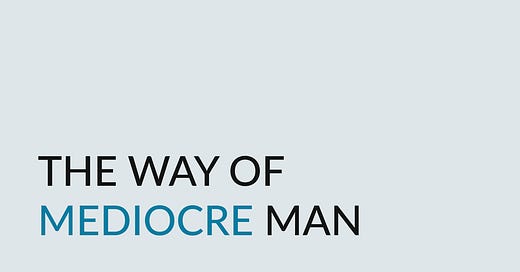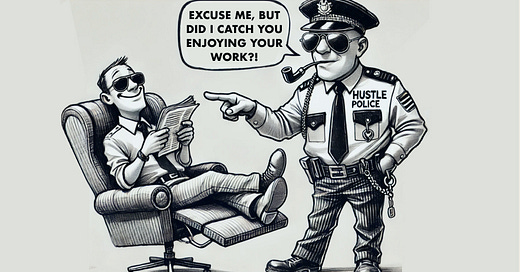June 24th, 2023: Greetings from Austin! I am re-posting an essay I shared on my blog this week (do people still read websites?!). A lot of people seemed to like this one so I wanted to share it here.
#1 The Way of Mediocre Man
Mediocre man flows through life. It is his birthright. He is not great man aiming at great results but merely trying to do enough of the right things over a long period of time such that it might lead somewhere interesting.
Mediocre man is one who learns to trust the journey because he is fully aware that one cannot quite know what will result from any specific effort. Society tells him he is lazy and that he is a fool and that he should have goals, big goals! But he has stumbled upon a secret: mediocre effort beats extreme effort for most people, most of the time.
A little bit of effort into something you like doing can have shockingly good results over a long period of time. It took me 14 months to write my book, and the entire process felt leisurely, light, and enjoyable. When I finished, I was shocked by the quality of my creation. It delighted me. I decided I wanted to share it with the world immediately. I skipped any sort of book launch and started selling it. I sold a couple of hundred books in the first month and declared it a success. To someone aiming at great results, this would have been a disaster.
But I was playing a different game than most other people. Writing was something I thoroughly enjoyed and planned to do for the rest of my life. The topic of my book is something I continue to be passionate and I didn’t expect my curiosity to die with the release of my book. I was playing a game I wanted to keep playing, and more importantly, knew I could keep playing.
We are flooded with ideas about how we should work that tells us we need to inject extreme effort and “do our best” in everything we do. We need to cash in. Get our money’s worth. Don’t get taken advantage of. Those things are useful to be mindful of but lead too many astray. People have a hard time believing that an attitude of lightness and ease can be compatible with work because they have so deeply internalized the idea that doing anything good must involve extreme effort.
The Gospel Of Effort
The gospel of effort is so pervasive that even if something might feel easy, people tell a story about how hard it is. This widespread tendency undermines any hope of self-awareness about one’s relationship with work. Someone might have found something they can do over the long term, but the need to “sell” a narrative of struggle nudges them toward eventually living out that struggle and pushing them to burnout. As the poet David Whyte says, “You cannot enter a world for which you do not have the language.”
I have met many people that are deeply connected to what they are doing. They are playing an infinite game not dependent on hustle but on ensuring that they protect that special relationship with their work. They have something that enriches their soul, and when you poke around a bit with the right questions, their eyes light up with the glow of a thousand fireflies. But the fabric of reality in which they exist short-circuits their own understanding.
This is further complicated by the fact that most people alive today don’t have the privilege of experiencing this deeper connected state with their work. Most people are spending their time pretending to care about work that they acknowledge is meaningless. When I worked in consulting, at least once a week, someone would say, “I know this is ultimately pointless, but you gotta work, right?” When you are doing this kind of work, it demands constant effort because you are moving directly against your own natural interests and curiosity. They have outsourced space on their must-do list to the leaders of a faceless organization.
Mediocre man rejects this.
There is a lot of talk about writing as a grind. A struggle. A metaphorical “war” every time you sit down. This could describe the kinds of copywriting that people do to promote products or the writing that people think they should do. But it has not been my experience that writing involves anything close to the flavor of effort that I expended debating the titles of PowerPoint slides on my previous path. But I’m not saying writing is easy, either! Mediocrity and challenge can coexist. What I am saying is that the challenge of working your way through a piece of writing does not require extreme effort. More important is having an ongoing relationship with writing that you want to nourish and sustain.
This is the secret of mediocre man: liking what you do. For years, I have had a mantra, write most days. I probably write four or five days a week on average but sometimes zero days per week. To the person living in the world of grind, this would be terrifying. How do you measure, track, and keep yourself accountable? Don’t you have goals? But my method has worked. How? By liking what you do, you will inevitably form a positive relationship with your work and want to do more of it. Then the only challenge is creating space in your life to let it happen.
Great Men and Women Do Exist, But You Are Not One
It is worth acknowledging that great men and great women do exist. But we are tricked by their proximity. We see them 18 inches away on our screens and assume we are like them. Or that we should be like them. This is a mistake. I have also met many people who are wired to operate at higher levels of energy and total commitment to work, combined with the self-confidence that they are meant to be doing such things. But here’s the thing about these people: they have never had to force themselves to be this way. They have been wired like this their whole lives. They aren’t reading this essay. They are going hard on their thing.
The central feature of writing and the many other kinds of work that lend themselves to mediocrity is that there is no arrival. Visceral opposition to the idea of mediocrity almost always arises from people with clear goals, ones that suggest arrival. And that works remarkably well for some people. This essay isn’t for those people.
Part of why this is so hard to talk about and see is that the modern career thrusts people into effort mode. Steady employment is no longer guaranteed. It requires a base level of anxiety about employability, an effort to maintain prosocial connections, awareness of the latest business trends, and an ability to “power through” rough stretches at work.
If you are intrigued by this idea, you are probably like me. You don’t dedicate your life to work above all else. When a friend in need calls, you drop things and help them. You don’t see the point of your life as one that should achieve and succeed above all else, and every time you’ve tried, you’ve ended up a little bit burned out.
Don’t Waste Effort On Trying
I came across a phrase from coach Joe Hudson that perfectly encapsulates the secret of mediocrity that I haven’t been able to get out of my head:
“Don’t waste effort on trying.”
Most of us likely have a fixed amount of effort that we can use up in a day or week. If we waste most of that effort on things we don’t want to do, we might end up wasting years of our lives. I spent ten years working in the strategy consulting industry. At first, I loved the work. It was challenging and pushed me to be better in many ways. But toward the tail end of that decade-long chapter, I had to use up far too much energy for the tiniest of tasks. Even on light weeks, I’d have nothing left after getting home from work.
The best way to use our effort is to “spend it” on daily, weekly, or monthly practices, which we can sustain longer than most others. This is the secret of mediocrity. It only appears mediocre from another person’s perspective. Over long enough time horizons, you can actually become one of the best in the world at your craft because of a simple truth: most people quit.
If you are trying to be great man or woman, there is a playbook. If there isn’t a playbook, there’s at least a legible goal. Let’s say you want to be a billionaire. If that is true, it’s pretty simple. Just prioritize that above everything else in your life and be relentless about it. Simple but damn hard.
Mediocrity does not come with a playbook and requires a stance toward life that is fundamentally different from what it takes to succeed on a traditional path. It requires emotional sophistication and a tolerance for ambiguity and uncertainty. It requires enough self-awareness to know what you might be deluding yourself about your own desires. And it requires time and patience to develop these capacities. Sometimes even an extended break from work.
A younger me would have a hard time believing any of this is possible. I once thought that life was a series of incremental sacrifices. Play by the rules, and everything will be okay. But this is not true and it certainly wasn’t for me. Building my life around a path that required extreme effort was risky. Because it enabled me to hide behind the veneer of a successful career. By staying on a path that required increasing levels of effort to maintain, I lost track of what I cared about and was chipping away at a fundamental enthusiasm for life.
Extreme effort can only be maintained, not sustained. In most cases, it is fueled by drugs, alcohol, nice stuff, and fancy vacations. You relieve stress but never escape low-grade anxiety that becomes your daily companion. Do this long enough, and you accept that a life filled with a constant stream of busyness is your birthright. You tell yourself that you are not special. You find something good enough, often a job, and try to maximize the income you can earn from such things. You get by.
We have convinced far too many people to chase things that are not aligned with their ideal states of being, and it has robbed them of their own belief in their potential. For years, I mistakenly paired my inability to grind with a lack of competence and ability. I existed in a world of extreme effort and had consistently mediocre results. I didn’t think I was capable of doing great work. But now I have tasted the sweet fruits of mediocrity and know that it can be a path to thriving. I know that mediocre effort only means mediocre output if you are stuck doing things that you don’t care about. The truth is that great work does not always require extreme effort.
In today’s world, almost everyone blindly embraces an ethic of “hard work.” But what they are really doing is embracing an ethic of extreme effort. This is not ideal. Today’s problems that we struggle with are increasingly not effort problems but imagination and ingenuity problems. They don’t require more bodies and hustle but steady mediocre work that involves rest, contemplation, and ease.
If hard work were really what it took to flood our reality with great things, we would live in a golden age of impressive works of consequence. Alas, we are not.
So I urge you to consider injecting your life with a little bit of mediocrity. Or better yet, don’t do much at all. You might end up somewhere interesting.
You can also find this on my website.
#2 Anna Gát Is Building “Culture without Culture War”
On my podcast, we talked about growing up in Hungary, emigrating at the age of 30, staying curious as we age, Interintellect, building a startup, bad advice, and trusting your gut; her article in 2018, culture without culture war, creating your own gatekeepers, and success in the UK vs. US
I first found
writing on Twitter in 2019, she was part of an emerging collection of internet-native curious humans. She coined the term “inter-intellect” to describe this digital scene and eventually launched a company to bring people together around ideas. I’ve personally met many people through her community that have become friends from around the world, including hosting a 3-hour salon on work with Orpheas( ), who I later met in person in NYC.This conversation was a delight, and I’m excited to see what Anna continues to help bring into the world:
Thanks For Reading!
I am focused on building a life around exploring ideas, connecting and helping people, and writing. I’ve also recently launched a community called Find The Others. There are weekly writing sessions, monthly “find the others” (literally) meetups and general supportive vibes.
You can join Find The Others if you want to hang with us too, or if you are already a subscriber, get access here.
If you’d like to support my journey, the best ways are to:
Buy or listen to my book, The Pathless Path (or message me if you want to bulk order at a lower price)
Want to reach 13k+ curious humans? I’m looking for sponsors for 2023 for this newsletter or podcast. Please reach out or book a package here directly.
Subscribe to my podcast and leave a review.
In addition, I recommend all of the following services (affiliate links): Riverside.fm for HD podcasting, Descript for text-based video editing, Transistor for podcast hosting, Podia or Teachable for courses, Skystra for WordPress Hosting, and Circle for running a community.
A reminder: I don’t check unsubscribe alerts and never look at my subscriber list. So if you feel like unsubscribing, you can do so below.















I loved this, especially after being wrong-footed by the title into thinking it would be scathing about 'Mediocre Man'. Actually I've read enough of Paul's work to doubt that statement, but this piece really caught me off-guard even with that knowledge. It's an example of what it's about: finding the sweet spot, 'by liking what you do, you will inevitably form a positive relationship with your work and want to do more of it.'
'Veneer of a successful career'. Your writing is delightful as it is eye-opening, Paul. A great read as always!